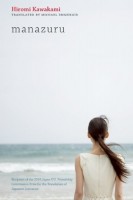 Author: Hiromi Kawakami
Author: Hiromi Kawakami
Translator: Michael Emmerich
U.S. publisher: Counterpoint
ISBN: 9781582436005
Released: August 2010
Original release: 2006
Awards: Art Encouragement Prize, Japan-U.S. Friendship Commission Prize
My introduction to the work of Hiromi Kawakami was through the annual literary journal Monkey Business: New Writing from Japan which regularly features her short fiction. In fact, her quirky series of vignettes, “People from My Neighborhood,” is one of the recurring selections that I most look forward to from issue to issue. Recently I was reminded that some of her long form work had also been translated, most notable her award-winning novels The Briefcase and Manazuru. Of the two, Manazuru was the first to be released in English. The novel, originally published in Japan in 2006, was selected for the Japanese Literary Publishing Project and has also been translated into several other languages, including French, German, and Russian. Michael Emmerich’s English translation of Manazuru was published by Counterpoint Press in 2010 and received a Japan-U.S. Friendship Commission Prize. Manazuru was also very well received in Japan; Kawakami was awarded an Art Encouragement Prize from the Ministry of Education for the novel’s literary achievements.
Over a decade ago, Kei Yanagimoto’s husband Rei disappeared without a trace. No one seems to know what happened to him or where he went, why he abandoned Kei and their three-year-old daughter Momo, or if he is alive or dead. But life continues on for Kei. She and Momo now live together with her aging mother and she’s even having an affair with Seiji, a married man she met through her work as a freelance writer. But she still misses Rei tremendously and she feels his absence daily. As Momo grows older and matures she becomes more distant and Kei is afraid that she may lose her daughter as well. Kei has yet to come to terms with Rei’s disappearance and struggles to remember and to forget at the same time. When Kei discovers “Manazuru” written in a diary that Rei left behind she finds herself compelled to return to that seaside town again and again, chasing after some sort of long-lost memory. Manazuru holds meaning for Kei, for her past and for her future, if only she can open herself to discover it.
Manazuru is a poetic and atmospheric novel with a touch of the surreal. The narrative is told entirely from Kei’s perspective in an almost stream-of-conscious fashion as she moves from moment to moment in her life and from memory to memory. There is an intense sense of longing present in Manazuru. It is very clear that Kei loves and adores Rei. His disappearance is difficult for Kei to accept but even more difficult is not knowing the reasons why he is gone; Kei’s internal self is understandably in turmoil. As the novel progresses, and as Kei searches her very soul for answers and remembers more and more about herself and about her husband, what is real and what is imagined begin to increasingly blur together. Kei’s perception of the truth unravels and frays, lending a dreamlike quality to Manazuru, only to be woven together again as she forms a new understanding and acceptance of everything that has passed.
Overall, Manazuru is quiet, ethereal, and melancholic. The slow and subdued drive of the novel comes almost exclusively from Kei’s thoughts and feelings rather than from outside of herself. More than it is about an action-heavy plot, Manazaru is about Kei’s relationship with and to others, especially her family and her lover, but that doesn’t mean that the novel is lacking in drama. Kei’s mother never liked Rei to begin with; Momo starts to look more and more like her father; Seiji is Rei’s complete opposite, but that only serves to repeatedly remind Kei of her husband. Although Rei is missing, he is very much the largest presence in Kei’s life, a shadow that haunts her and that obscures the people around her. The more Kei tries to remember the more she forgets and the more she tries to forget the more she remembers. Manazuru is a meditation on memory, loss, and letting go. It’s a beautifully poignant and moving work.

Leave a Reply